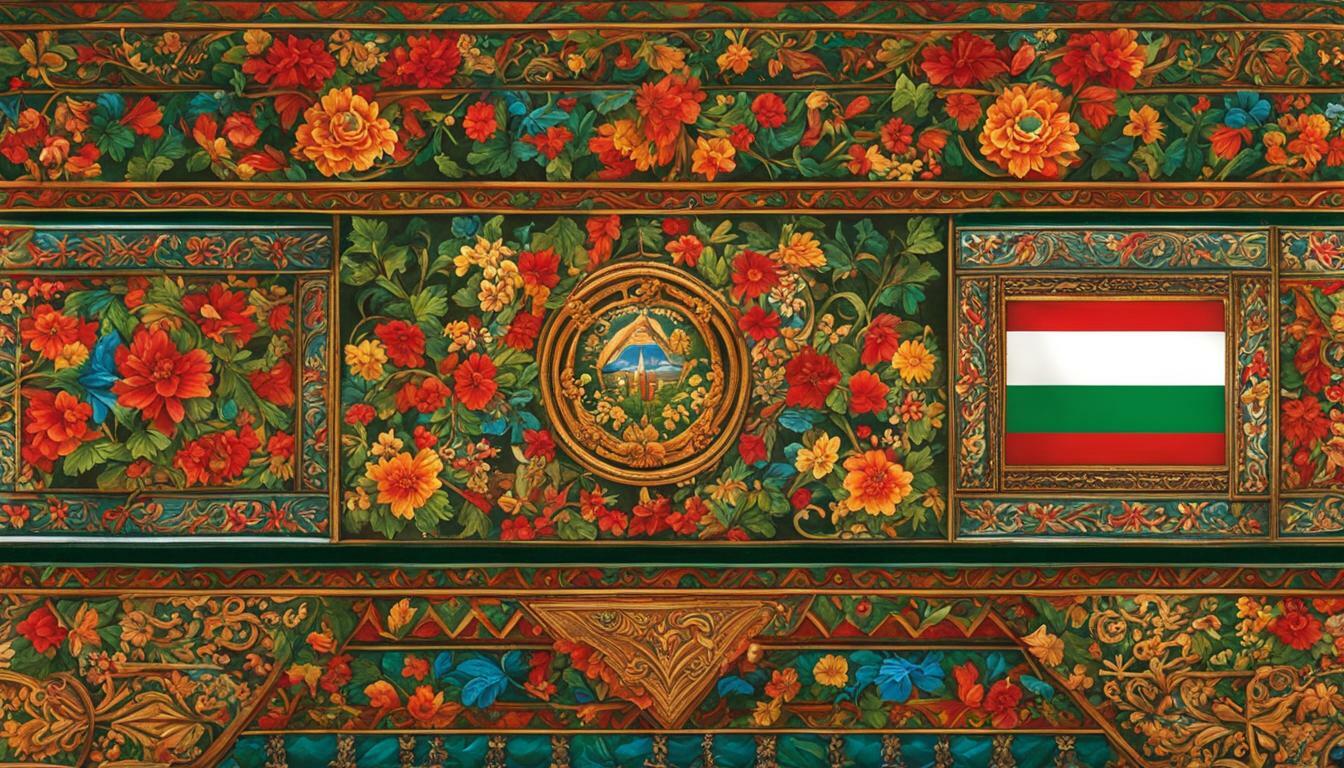Bulgaria is a country in Eastern Europe with a rich linguistic culture, and in this section, we will explore the primary language spoken in the country.
Key Takeaways
- Bulgarian is the official language of Bulgaria and spoken by 85% of the population.
- Other languages spoken in Bulgaria include Turkish, Romani, Russian, Armenian, Romanian, Greek, Vlach, Ukrainian, and Macedonian.
- Turkish is the second most spoken language in Bulgaria, with a significant Turkish-speaking community.
- Romani is also spoken by a significant minority in Bulgaria.
- Bulgarian-speaking communities can be found in countries such as North Macedonia, Ukraine, Moldova, Serbia, Romania, Hungary, Albania, and Greece.
The Bulgarian Language
The Bulgarian language serves as the primary means of communication in Bulgaria, and it is known for its fascinating linguistic features. One notable characteristic of the Bulgarian language is its use of the Cyrillic script, which is the official writing system in the country. The Cyrillic script, consisting of 30 letters, was introduced during the First Bulgarian Empire in the 9th century and has been an integral part of the Bulgarian language ever since.
With its Slavic roots, the Bulgarian language shares similarities with other Slavic languages, such as Russian, Serbian, and Ukrainian. However, it also has distinct features that set it apart. For example, Bulgarian has a complex verbal system that includes aspects such as perfect and imperfect, indicating different levels of action completion. Additionally, the language has a rich vocabulary and a unique sentence structure that emphasizes word order.
The Cyrillic Script in Bulgaria
The Cyrillic script plays a significant role in Bulgarian culture and identity. It is not only used for writing the Bulgarian language but is also the official script for several other Slavic languages, including Russian, Ukrainian, and Serbian. This common script fosters a sense of unity among Slavic-speaking nations. Learning to read and write in Cyrillic is a fundamental part of education in Bulgaria and is crucial for preserving the nation’s cultural heritage.
Below is a table that demonstrates the Cyrillic alphabet used in Bulgaria:
| Letter | Transliteration | Pronunciation |
|---|---|---|
| А | A | [a] |
| Б | B | [b] |
| В | V | [v] |
| Г | G | [g] |
| Д | D | [d] |
| Е | E | [e] |
| Ж | Zh | [ʒ] |
| З | Z | [z] |
| И | I | [i] |
| Й | I | [j] |
| К | K | [k] |
| Л | L | [l] |
These are just a few examples, illustrating the beauty and complexity of the Bulgarian language and its unique script.
Linguistic Diversity in Bulgaria
Apart from Bulgarian, several other languages are spoken in Bulgaria, reflecting the country’s diverse cultural heritage. The linguistic landscape of Bulgaria is rich and varied, with communities speaking languages such as Turkish, Romani, Russian, Armenian, Romanian, Greek, Vlach, Ukrainian, and Macedonian.
Turkish is the second most spoken language in Bulgaria after Bulgarian, with a significant number of speakers. It has historical significance in the region as it was the language of the Ottoman Empire. Turkish is widely spoken, not just in Bulgaria, but also across the globe, with approximately 75 million speakers worldwide.
Another notable language spoken in Bulgaria is Romani, which is spoken by a significant minority. Romani holds deep cultural importance for the Romani community and contributes to Bulgaria’s linguistic diversity.
Language Communities in Bulgaria
Bulgaria is also home to diverse language communities, both within its borders and beyond. Bulgarian-speaking communities can be found in neighboring countries such as North Macedonia, Ukraine, Moldova, Serbia, Romania, Hungary, Albania, and Greece. These communities contribute to the preservation and promotion of the Bulgarian language abroad.
| Language | Number of Speakers |
|---|---|
| Bulgarian | 85% of the population |
| Turkish | Second most spoken language |
| Romani | Significant minority |
| Russian, Armenian, Romanian, Greek, Vlach, Ukrainian, Macedonian | Among other languages spoken |
As the linguistic mosaic of Bulgaria continues to evolve, it represents a testament to the country’s multicultural heritage and the vibrant coexistence of different language communities.
Turkish in Bulgaria
Turkish is the second most spoken language in Bulgaria and has historical importance due to its association with the Ottoman Empire. Today, there is a sizable Turkish-speaking community in the country, contributing to the linguistic diversity of Bulgaria.
The Turkish language holds great significance in Bulgaria, given its historical ties with the Ottoman Empire. It is estimated that there are approximately 75 million Turkish speakers worldwide, making it one of the most widely spoken languages globally.
In Bulgaria, Turkish is spoken primarily by the Turkish-speaking community, which has a rich cultural heritage and adds to the multicultural fabric of the country. Turkish-speaking Bulgarians have preserved their language and cultural traditions, creating a vibrant and diverse linguistic landscape within the nation.
| Language | Number of Speakers |
|---|---|
| Turkish | Approximately 75 million worldwide |
Romani and Other Minority Languages
In addition to Bulgarian and Turkish, the Romani language and other minority languages contribute to the linguistic diversity of Bulgaria. These languages are spoken by various communities within the country, adding richness to the cultural tapestry of the region.
Romani, also known as the language of the Roma community, holds a significant place in Bulgaria. With roots in the Indo-Aryan language family, Romani is spoken by the Roma people, an ethnic minority group scattered across Europe. Its distinct vocabulary and grammar make it an important part of Bulgaria’s linguistic landscape.
Alongside Romani, there are several other minority languages spoken in Bulgaria. These include Russian, Armenian, Romanian, Greek, Vlach (Aromanian and Romanian), Ukrainian, and Macedonian. Each of these languages represents the heritage and traditions of the respective communities within the country.
The linguistic diversity of Bulgaria is a testament to the multiculturalism and inclusivity of the nation. It highlights the coexistence of different ethnic groups, each with their unique language and cultural identity.
| Language | Number of Speakers |
|---|---|
| Turkish | Approximately 75 million worldwide |
| Romani | Estimated tens of thousands in Bulgaria |
| Russian | Significant community in Bulgaria |
| Armenian | Small community in Bulgaria |
| Romanian | Minority community in Bulgaria |
| Greek | Several thousand speakers in Bulgaria |
| Vlach (Aromanian and Romanian) | Small community in Bulgaria |
| Ukrainian | Small community in Bulgaria |
| Macedonian | Significant community in Bulgaria |
Bulgarian Language Abroad
The Bulgarian language extends beyond the borders of Bulgaria, with Bulgarian-speaking communities found in several countries. These communities have preserved their language and cultural heritage, creating a sense of belonging and connection to their Bulgarian roots.
In North Macedonia, there is a significant Bulgarian-speaking community, particularly in the regions bordering Bulgaria. This community has played an important role in maintaining the Bulgarian language and culture in the country.
Ukraine, Moldova, Serbia, Romania, Hungary, Albania, and Greece are also home to Bulgarian-speaking communities. These communities serve as a testament to the wide reach and influence of the Bulgarian language, even outside of Bulgaria. They contribute to the cultural diversity of these countries and foster connections between different Bulgarian communities.
| Country | Estimated Number of Bulgarian Speakers |
|---|---|
| North Macedonia | Approximately 100,000 |
| Ukraine | Approximately 40,000 |
| Moldova | Approximately 9,000 |
| Serbia | Approximately 5,000 |
| Romania | Approximately 3,000 |
| Hungary | Approximately 2,000 |
| Albania | Approximately 1,500 |
| Greece | Approximately 1,000 |
These Bulgarian-speaking communities abroad serve as a testament to the resilience and connection of the Bulgarian language, maintaining its presence and allowing for cross-cultural exchange. They contribute to the diversity of languages and cultures in these countries, enriching the overall linguistic landscape of the region.
Language Influence in Bulgaria
The Bulgarian language has been shaped and influenced by its neighboring languages, resulting in a unique linguistic blend. Located in Eastern Europe, Bulgaria shares borders with several countries, each with their own distinct languages. This geographical proximity has led to linguistic exchanges and the assimilation of vocabulary and grammatical features from neighboring languages.
In terms of language influence, the Slavic languages have had a significant impact on Bulgarian. As a member of the Slavic language family, Bulgarian shares many similarities with Russian, Ukrainian, and other Slavic languages. This includes similarities in vocabulary, grammar, and pronunciation. The influence of Slavic languages on Bulgarian is particularly evident in the shared Cyrillic script used for writing.
Furthermore, the Bulgarian language has also been influenced by Balkan languages. The Balkans is a region known for its linguistic diversity, with various languages spoken in close proximity. As a result, Bulgarian has incorporated vocabulary and expressions from Balkan languages such as Greek, Romanian, and Turkish. This linguistic borrowing has enriched the Bulgarian language and added to its unique character.
Language Influence Table:
| Language | Influence on Bulgarian |
|---|---|
| Slavic languages | Shared vocabulary, grammar, and Cyrillic script |
| Balkan languages | Incorporation of vocabulary and expressions |
| Eastern European languages | Shared linguistic features and exchanges |
In summary, the Bulgarian language is an amalgamation of influences from neighboring Slavic and Balkan languages. This linguistic blend not only reflects Bulgaria’s geographical location but also its historical and cultural ties with its neighboring countries. By embracing the linguistic diversity of its region, Bulgarian has evolved into a rich and vibrant language, representative of the country’s complex heritage.
Conclusion
The language spoken in Bulgaria is primarily Bulgarian, with a significant Turkish-speaking community and the presence of other minority languages, reflecting the country’s diverse linguistic heritage.
Bulgarian is the official language of Bulgaria and is spoken by approximately 85% of the population. It is known for its unique characteristics, including the use of the Cyrillic script. The language has a rich history and is an important part of Bulgarian culture and identity.
In addition to Bulgarian, there are several other languages spoken in Bulgaria. Turkish is the second most spoken language in the country, with a sizable Turkish-speaking community. Romani, Russian, Armenian, Romanian, Greek, Vlach (Aromanian and Romanian), Ukrainian, and Macedonian are also spoken by different communities in Bulgaria.
Outside of Bulgaria, there are Bulgarian-speaking communities in various countries such as North Macedonia, Ukraine, Moldova, Serbia, Romania, Hungary, Albania, and Greece. This demonstrates the global presence and influence of the Bulgarian language.
The linguistic diversity in Bulgaria is further influenced by other Eastern European, Slavic, and Balkan languages. These languages have left their mark on Bulgarian, contributing to its development and evolution over time.
In conclusion, the language spoken in Bulgaria is primarily Bulgarian, but the country’s linguistic landscape is rich and diverse. With a significant Turkish-speaking community and the presence of other minority languages, Bulgaria celebrates its multiculturalism and embraces the cultural heritage of its diverse population.
FAQ
What language do they speak in Bulgaria?
The official language of Bulgaria is Bulgarian, which is spoken by 85% of the population.
Are there other languages spoken in Bulgaria?
Yes, besides Bulgarian, other languages spoken in Bulgaria include Turkish, Romani, Russian, Armenian, Romanian, Greek, Vlach (Aromanian and Romanian), Ukrainian, and Macedonian.
What is the second most spoken language in Bulgaria?
Turkish is the second most spoken language in Bulgaria.
Is Romani also spoken in Bulgaria?
Yes, Romani is spoken by a significant minority in Bulgaria.
Are there Bulgarian-speaking communities outside of Bulgaria?
Yes, there are Bulgarian-speaking communities in countries such as North Macedonia, Ukraine, Moldova, Serbia, Romania, Hungary, Albania, and Greece.
How many Turkish speakers are there worldwide?
Turkish is a widely spoken minority language in Bulgaria, with 75 million speakers worldwide.
What is the historical significance of the Turkish language in Bulgaria?
Turkish was the language of the Ottoman Empire and has historical significance in the region.



